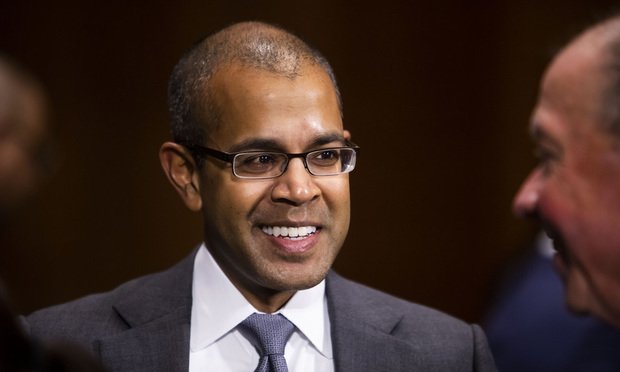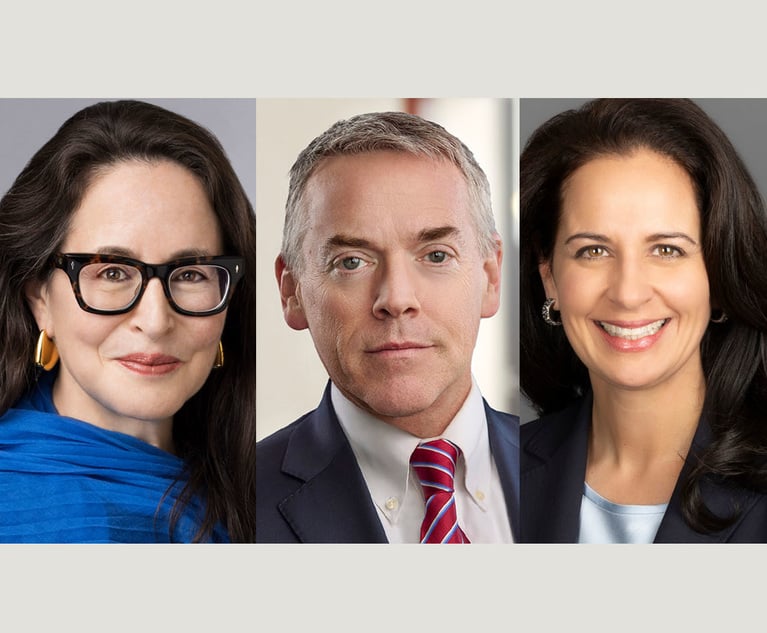Daily Dicta: Shanmugam Marks One Year at Paul Weiss with Back-to-Back Blockbuster Arguments—3,000 Miles Apart
"It sounds completely clichéd, but it's all about preparation," Shanmugam said.
February 06, 2020 at 12:23 AM
6 minute read
 Kannon Shanmugam
Kannon Shanmugam
It's been just over a year since Kannon Shanmugam shook up the appellate bar by jumping from Williams & Connolly to Paul Weiss, where he both chairs the firm's Supreme Court and appellate practice and manages the 85-lawyer D.C. office.
Not that he was actually in Washington to celebrate. Instead, Shanmugam in the last two days has criss-crossed the country to deliver appellate arguments in two big cases on opposite coasts.
On Tuesday, he was in New York before the U.S. Court of Appeals for the Second Circuit, arguing that hedge fund founder Murray Huberfeld was improperly sentenced to 30 months in prison for his role in a scheme to bribe the former president of the nation's largest municipal correction officers union.
 As soon as the argument ended, Shanmugam and associate Will Marks went straight to the airport to catch a flight to California. After a quick stop at In-and-Out Burger (a must for Shanmugam before any West Coast appellate appearance), he argued on Wednesday before a Ninth Circuit panel in Pasadena on behalf of ExxonMobil and other energy companies in the climate-change tort litigation.
As soon as the argument ended, Shanmugam and associate Will Marks went straight to the airport to catch a flight to California. After a quick stop at In-and-Out Burger (a must for Shanmugam before any West Coast appellate appearance), he argued on Wednesday before a Ninth Circuit panel in Pasadena on behalf of ExxonMobil and other energy companies in the climate-change tort litigation.
I've written before about how other appellate aces handle back-to-back appearances. What's Shanmugam's approach?
In a word, preparation. "It sounds completely clichéd, but it's all about preparation," he said in an interview while waiting to catch a flight back to Washington.
For these two cases, he started drilling deep in early January, then followed up with two moot court arguments per case.
He also rehearses by talking to himself—he'll shut himself up in a conference room and practice giving answers, to get a sense of how the words actually sound when spoken aloud.
It's not enough just to master the law and the facts on paper, Shanmugam noted. "If you can't figure out how to express an idea and do so succinctly, it doesn't do you any good."
Given the two cases' divergent subject matter, there was "not much risk of confusion," he said with a laugh, but still, prepping for the appearances was an exercise in multi-tasking.
"It's a lot easier to focus on one thing at a time. I pine for the days when I was able to do that," he said. "But learning how to multitask comes with the territory."
At the Second Circuit, Shanmugan appeared before a lively panel—judges Gerard Lynch, Steven Menashi and Rosemary Pooler—deftly parrying their questions. (You can listen to the recording here—it's case 19-436.)
Shanmugam's client Huberfeld founded hedge fund Platinum Partners. According to the Justice Department, Huberfeld paid Norman Seabrook, the president of the Correction Officers' Benevolent Association, $60,000 in cash (delivered "in a luxury men's handbag") in exchange for investing $20 million of the union's money in Platinum Partners. The funds included $15 million from a retirement benefits program funded by the City of New York that invests money for correction officers' retirements.
The payment was hidden via a fraudulent invoice for $60,000 that, on its face, billed Platinum for seven pairs of courtside tickets to New York Knick games.
Ultimately, Platinum collapsed and the union lost $19 million of its investment.
Huberfeld pleaded guilty to conspiring to commit wire fraud. In February of 2019, U.S. District Judge Alvin Hellerstein sentenced him to 30 months in prison and ordered him to pay $19 million in restitution.
The problem, Shanmugam explained, is that Hellerstein used the guideline for commercial bribery– 30 to 37 months–to arrive at the 30 month term. The correct range for conspiring to commit wire fraud was six to 12 months, he said.
The government conceded the error but argued it was harmless because Judge Hellerstein stated in passing that he would have imposed the same sentence regardless.
"This court has never… applied harmless error to an error of that magnitude," Shanmugam told the panel. "A judge cannot sentence someone for another offense…He sentenced Mr. Huberfeld for bribery."
"This court should vacate and remand…so that Judge Hellerstein or another judge can determine whether an upward departure from the correct range was warranted."
Shanmugam also asked the court to set aside the $19 million restitution award, which the district court awarded even though the government didn't ask for it. The fine came on top of the $7 million Huberfeld already paid voluntarily.
At the Ninth Circuit, Shanmugam on Wednesday shared time at the podium with Gibson, Dunn & Crutcher's Theodore Boutrous Jr. in City of Oakland v. BP. (Check out the video here.)
Oakland and San Francisco are suing BP, Chevron, ConocoPhillips, Exxon Mobil and Royal Dutch Shell, invoking public nuisance and seeking to hold them accountable for the costs of sea walls and other infrastructure necessary to protect against ongoing and future consequences of climate change.
The initial fight is over jurisdiction. In 2018, U.S. District Judge William Alsup dismissed the complaint, writing that "The court will stay its hand in favor of solutions by the legislative and executive branches."
In addition, Alsup also dismissed the claims against ExxonMobil, BP, Royal Dutch Shell, and ConocoPhillips, ruling that those companies lacked sufficient minimum contacts with California to support personal jurisdiction.
Shanmugam's task: To convince the Ninth Circuit panel to affirm dismissal on the issue of personal jurisdiction for the non-resident defendants.
"The applicable test in this circuit is the 'but-for' test, whether defendants' California-related contacts were the 'but-for' cause of plaintiffs' injuries," he said.
"I think if you were to accept plaintiffs' position," he continued, "if you were both to sweep in all of our worldwide activities and to relax the 'but for' standard, you would not only be establishing a principle of effectively universal specific jurisdiction for these claims, which would have enormous consequences for these defendants, it would also have enormous consequences for anyone to whom climate change could be attributed—airplane manufacturers, airlines, car manufacturers, even the users of vehicles," he said. "And that would be a remarkably broad proposition."
This content has been archived. It is available through our partners, LexisNexis® and Bloomberg Law.
To view this content, please continue to their sites.
Not a Lexis Subscriber?
Subscribe Now
Not a Bloomberg Law Subscriber?
Subscribe Now
NOT FOR REPRINT
© 2025 ALM Global, LLC, All Rights Reserved. Request academic re-use from www.copyright.com. All other uses, submit a request to [email protected]. For more information visit Asset & Logo Licensing.
You Might Like
View All
Firms Come Out of the Gate With High-Profile Litigation Hires in 2025

2024 Marked Growth On Top of Growth for Law Firm Litigation Practices. Is a Cooldown in the Offing for 2025?

Big Company Insiders See Technology-Related Disputes Teed Up for 2025

Litigation Leaders: Jason Leckerman of Ballard Spahr on Growing the Department by a Third Via Merger with Lane Powell
Law Firms Mentioned
Trending Stories
- 1States Accuse Trump of Thwarting Court's Funding Restoration Order
- 2Microsoft Becomes Latest Tech Company to Face Claims of Stealing Marketing Commissions From Influencers
- 3Coral Gables Attorney Busted for Stalking Lawyer
- 4Trump's DOJ Delays Releasing Jan. 6 FBI Agents List Under Consent Order
- 5Securities Report Says That 2024 Settlements Passed a Total of $5.2B
Who Got The Work
J. Brugh Lower of Gibbons has entered an appearance for industrial equipment supplier Devco Corporation in a pending trademark infringement lawsuit. The suit, accusing the defendant of selling knock-off Graco products, was filed Dec. 18 in New Jersey District Court by Rivkin Radler on behalf of Graco Inc. and Graco Minnesota. The case, assigned to U.S. District Judge Zahid N. Quraishi, is 3:24-cv-11294, Graco Inc. et al v. Devco Corporation.
Who Got The Work
Rebecca Maller-Stein and Kent A. Yalowitz of Arnold & Porter Kaye Scholer have entered their appearances for Hanaco Venture Capital and its executives, Lior Prosor and David Frankel, in a pending securities lawsuit. The action, filed on Dec. 24 in New York Southern District Court by Zell, Aron & Co. on behalf of Goldeneye Advisors, accuses the defendants of negligently and fraudulently managing the plaintiff's $1 million investment. The case, assigned to U.S. District Judge Vernon S. Broderick, is 1:24-cv-09918, Goldeneye Advisors, LLC v. Hanaco Venture Capital, Ltd. et al.
Who Got The Work
Attorneys from A&O Shearman has stepped in as defense counsel for Toronto-Dominion Bank and other defendants in a pending securities class action. The suit, filed Dec. 11 in New York Southern District Court by Bleichmar Fonti & Auld, accuses the defendants of concealing the bank's 'pervasive' deficiencies in regards to its compliance with the Bank Secrecy Act and the quality of its anti-money laundering controls. The case, assigned to U.S. District Judge Arun Subramanian, is 1:24-cv-09445, Gonzalez v. The Toronto-Dominion Bank et al.
Who Got The Work
Crown Castle International, a Pennsylvania company providing shared communications infrastructure, has turned to Luke D. Wolf of Gordon Rees Scully Mansukhani to fend off a pending breach-of-contract lawsuit. The court action, filed Nov. 25 in Michigan Eastern District Court by Hooper Hathaway PC on behalf of The Town Residences LLC, accuses Crown Castle of failing to transfer approximately $30,000 in utility payments from T-Mobile in breach of a roof-top lease and assignment agreement. The case, assigned to U.S. District Judge Susan K. Declercq, is 2:24-cv-13131, The Town Residences LLC v. T-Mobile US, Inc. et al.
Who Got The Work
Wilfred P. Coronato and Daniel M. Schwartz of McCarter & English have stepped in as defense counsel to Electrolux Home Products Inc. in a pending product liability lawsuit. The court action, filed Nov. 26 in New York Eastern District Court by Poulos Lopiccolo PC and Nagel Rice LLP on behalf of David Stern, alleges that the defendant's refrigerators’ drawers and shelving repeatedly break and fall apart within months after purchase. The case, assigned to U.S. District Judge Joan M. Azrack, is 2:24-cv-08204, Stern v. Electrolux Home Products, Inc.
Featured Firms
Law Offices of Gary Martin Hays & Associates, P.C.
(470) 294-1674
Law Offices of Mark E. Salomone
(857) 444-6468
Smith & Hassler
(713) 739-1250






